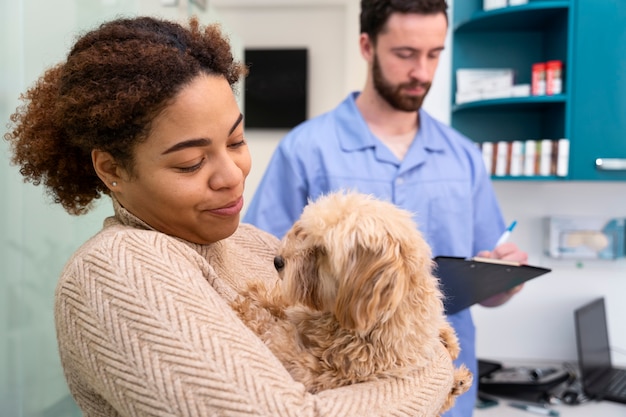Recognizing Signs of Heat Stress in Pets


Recognizing Signs of Heat Stress in Pets: Keeping Your Companion Safe in Alexandria’s Summer
Louisiana summers are famous for their relentless heat and humidity, and if you live in Alexandria or nearby communities, you know August can be particularly tough on both people and pets. As pet owners, it’s natural to worry about your furry friend’s comfort and safety when the temperatures soar. Unfortunately, heat stress is not just uncomfortable for pets; it can quickly become a serious, even life-threatening emergency if not recognized and treated promptly. At Rapides Animal Medical Center, located on Jackson Street in Alexandria, we are committed to helping families in Alexandria and surrounding communities understand the risks of heat stress, spot the early warning signs, and take action to keep pets safe.
This guide will explain the most common signs of heat stress in pets, discuss why our local climate puts dogs and cats at extra risk, describe what to do if your pet shows pet overheating symptoms, and offer practical tips to prevent heat exhaustion before it starts. Whether you’re looking for a vet near me, or want to know about quality veterinary services in Alexandria, understanding heat stress is essential for every pet owner during the summer. If you’re ever unsure about your pet’s wellbeing, our veterinary team is here to help—simply schedule an appointment or ask about a wellness examination to ensure your companion stays healthy and happy.
Spotting the Signs of Heat Stress in Pets
Identifying the signs of heat stress in pets early is crucial for preventing serious complications. Many pet owners assume their pets will naturally slow down or seek shade if they get too hot, but this is not always the case, especially for dogs and cats that are enthusiastic about playtime or walks. Key symptoms include excessive panting, which is often more rapid or intense than usual, and drooling that may be thicker or stickier. Owners may notice their dog or cat acting restless, seeking cool surfaces, or becoming unusually lethargic. Other signs to watch for are bright red gums or tongue, warm or dry nose and paw pads, stumbling or difficulty walking, vomiting, diarrhea, and in severe cases, collapse or seizures.
Pet overheating symptoms can develop quickly, particularly during midday walks or after being left outside, even for a short time. For example, a dog left in a parked car, even with the windows cracked, can start to show signs of distress within minutes. Cats are not immune either; indoor cats without access to cool water or ventilation can also develop heat stress. Recognizing these pet overheating symptoms as early as possible gives you the best chance of protecting your pet from lasting harm.
Why Are Alexandria Pets at High Risk for Heat Stress?
Our region’s unique climate plays a significant role in increasing the risk of heat stress in pets. Summers in Alexandria bring not only high temperatures but also intense humidity. This combination makes it harder for pets to cool themselves effectively, especially since dogs and cats do not sweat the same way humans do. Most cooling occurs through panting, which becomes less efficient as humidity rises.
Certain factors can make pets even more vulnerable. Brachycephalic breeds like Bulldogs and Persians, with their short noses, have greater difficulty dissipating heat. Senior pets, puppies, overweight animals, and those with chronic illnesses are also at increased risk. Even healthy pets can be affected if left outside without shade or water, exercised during the hottest part of the day, or kept in poorly ventilated rooms.
Pet owners in Alexandria and surrounding communities need to be aware that the risk of heat stress is often higher here than in cooler climates. Understanding the causes and contributing factors can help you make safer choices for your pet during the summer months.
Professional Treatment and What to Expect at Rapides Animal Medical Center
If you suspect your pet is experiencing heat stress, immediate action is essential. Once you have moved your pet to a cooler environment and offered fresh water, contact your veterinarian without delay. At Rapides Animal Medical Center, our veterinary professionals are experienced in managing heat stress cases with care and urgency. Treatment options involve a thorough physical assessment, gentle cooling techniques such as applying cool (not cold) water or wet towels, and administering intravenous fluids to correct dehydration and support vital organ function.
Depending on the severity of your pet’s symptoms, additional diagnostic testing such as blood work or monitoring for organ damage may be necessary. Our team will tailor the treatment plan to your pet’s specific needs and ensure that supportive care is provided throughout recovery. In many cases, prompt intervention allows pets to recover fully, but severe cases of heat stroke can result in complications, so follow-up care and monitoring may be recommended.
Scheduling a wellness examination is an excellent way to assess your pet’s overall health and discuss personalized preventive strategies with our veterinarians. We encourage all local pet owners to be proactive in seeking care, especially after any episode of heat stress, to ensure long-term wellbeing.
Preventing Heat Stress: Practical Tips for Pet Owners in Alexandria
Prevention is always better than treatment, especially in the case of heat-related illnesses. Keeping pets cool and comfortable during Alexandria’s hot summers is a shared responsibility among pet owners, and a few adjustments to daily routines can make a big difference. Steps include providing unlimited access to fresh, cool water at all times and ensuring pets have shaded areas outdoors. Avoid exercising your dog during peak sunlight hours; early mornings or late evenings are safer times for walks and playtime. Never leave pets in parked cars, even for a few minutes, as temperatures inside vehicles can rise rapidly and become deadly.
For indoor pets, keep living spaces well-ventilated and consider using fans or air conditioning on especially hot days. Grooming long-haired pets in accordance with breed recommendations can also help with heat regulation, but avoid excessive shaving as some coats provide natural insulation. Watch for signs of heat stress in pets, especially after any outdoor activity or if your pet seems less energetic than usual.
If you need to be away from home during the day, consider the benefits of overnight stays or day boarding at a trusted facility, where your pet can remain safe, cool, and supervised by experienced professionals. Our veterinary team at Rapides Animal Medical Center is happy to discuss all options for keeping your companion comfortable during the summer months.
When Should You Seek Veterinary Care for Heat Stress?
Knowing when to seek professional help can save your pet’s life. If your pet shows persistent signs of heat stress such as heavy panting, drooling, vomiting, diarrhea, stumbling, or collapse, do not attempt home remedies alone. Move your pet to a cool area, offer water, and contact your veterinarian immediately. Rapid intervention is critical, as delaying care can lead to lasting organ damage or even death.
Our clinic serves Alexandria and surrounding communities, and our veterinary professionals are prepared to handle urgent cases with compassion and expertise. If you have any doubts or concerns about your pet’s condition, it is always better to err on the side of caution and reach out for advice. For ongoing support and guidance, regular visits to a quality vet near me can provide peace of mind and ensure your pet receives the best possible care.
Take Action: Keep Your Pet Safe from Heat Stress in Alexandria
Heat stress is a real threat during Alexandria’s long, humid summers, but with the right knowledge and proactive care, you can help your pet stay comfortable and healthy all season long. Watch closely for the signs of heat stress in pets, respond to any pet overheating symptoms promptly, and never hesitate to seek professional help when needed. Our team of veterinarians at Rapides Animal Medical Center is dedicated to providing quality veterinary services in Alexandria, from preventive care to emergency support.
If you are concerned about your pet’s risk, or simply want a thorough health check before the next heat wave, we encourage you to schedule a comprehensive wellness examination or speak with our veterinary professionals about personalized prevention strategies. For those seeking a vet near me, our location at 5990 Jackson Street, Alexandria, LA 71303 is here for you and your pet.
Book your appointment online, call us at (318) 445-5245, or stop by to see how we can help protect your companion from the dangers of heat stress. At Rapides Animal Medical Center, we are proud to support pets and their families in Alexandria and surrounding communities with the highest level of care and compassion.
This blog is intended for informational purposes only and does not replace professional veterinary care. If you suspect your pet is in distress, contact your veterinarian immediately. For more information on heat stress in pets, visit trusted sources such as the American Veterinary Medical Association.


















